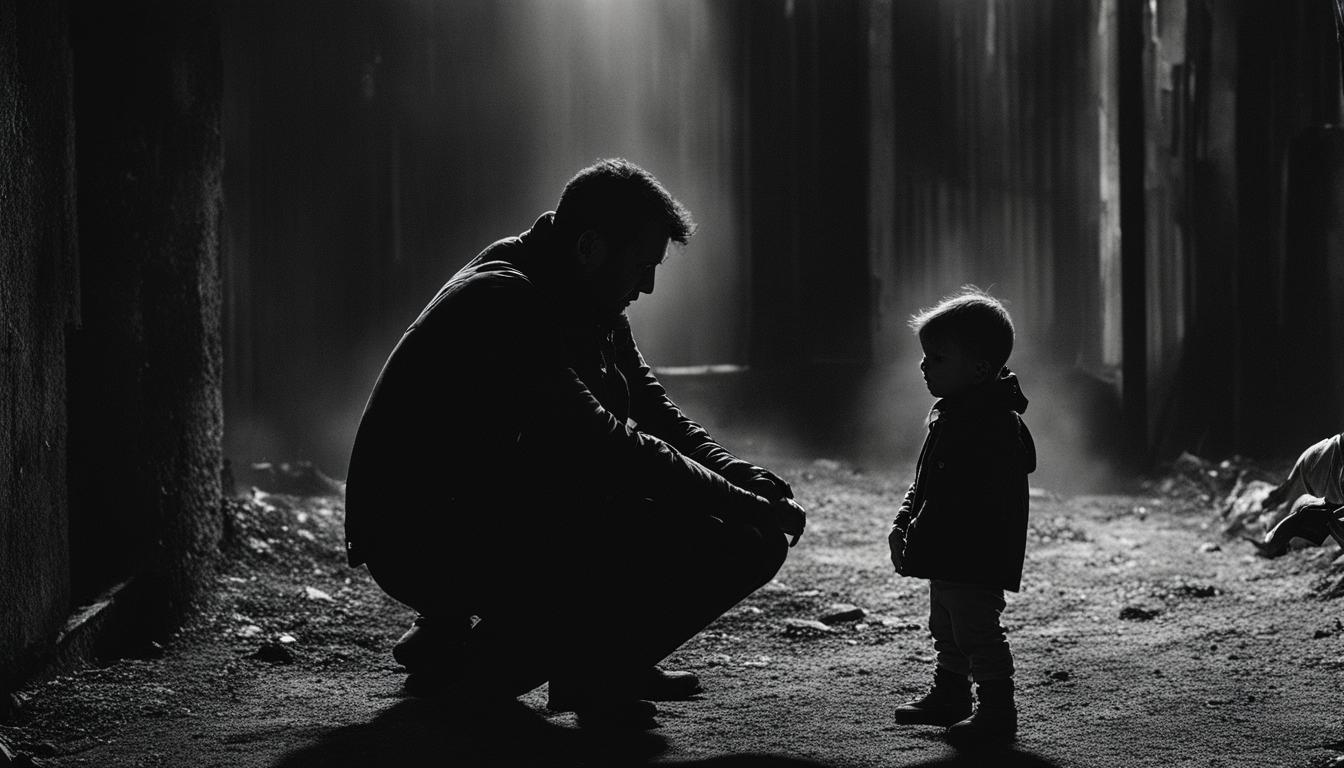Dealing with a father who has Borderline Personality Disorder can make navigating family relationships especially difficult, necessitating a profound understanding and a high level of empathy.
The impact of a BPD father on the family unit can be profound, affecting not just the individual, but also the dynamics within the household.
Recognizing the signs and behaviors associated with BPD in a father is just the beginning; understanding how to support both the individual and the family as a whole is essential for fostering a healthy environment.
Key Takeaways
- Recognize signs of anger, control, and emotional abuse in fathers.
- Implement DBT and mindfulness for self-awareness and coping.
- Therapy and support crucial for emotional exploration and healthy communication.
- Create stable, supportive environment for children’s well-being and healthy relationships.
Understanding Borderline Personality Disorder in Fathers
Understanding Borderline Personality Disorder in fathers is crucial for recognizing the signs and addressing the challenges that may arise within familial dynamics. When a father exhibits BPD behaviors such as anger, rage, and controlling tendencies, it can result in a tumultuous environment for the child. These behaviors often manifest as emotional abuse, with the child bearing the brunt of the father’s aggressive outbursts.
Substance abuse may further exacerbate the situation, intensifying manipulative and judgmental behaviors towards both the child and other family members. Fathers with BPD may struggle with regulating their emotions, leading to unpredictable and sometimes harmful actions. By understanding these traits and behaviors associated with BPD in fathers, we can better comprehend the complexities involved and work towards creating a healthier and more stable environment for the child to grow and thrive.
Impact of BPD on Father-Child Relationships

The impact of Borderline Personality Disorder on father-child relationships is profound, shaping dynamics with intense emotional reactions and challenging behaviors. Children of fathers with BPD may encounter tumultuous relationships characterized by emotional manipulation and judgmental behavior. Substance abuse issues in BPD fathers can further strain the connection with their children, hindering the development of a healthy relationship.
Strict or controlling parenting behaviors exhibited by fathers with BPD can have adverse effects on the emotional well-being of their children. The emotional instability and manipulative tendencies associated with BPD can make it difficult for these fathers to establish a secure bond with their children, leading to a turbulent and unpredictable environment within the family.
The impact of BPD on father-child relationships highlights the need for understanding and support to navigate the complexities of this challenging dynamic.
Coping Strategies for Fathers With BPD
To effectively navigate the challenges of Borderline Personality Disorder, fathers with BPD can benefit significantly from implementing coping strategies tailored to managing intense emotions and fostering healthier relationships with their children.
Dialectical behavior therapy (DBT) offers fathers with BPD practical skills to regulate their emotions effectively. Developing self-awareness and engaging in mindfulness practices can help fathers recognize triggers and respond in a more balanced manner, enhancing their interactions with their children.
Consistent therapy sessions provide fathers with a safe space to explore their emotions and behaviors, leading to a better understanding of how to improve their relationships. Learning healthy communication skills is crucial for fathers with BPD to express themselves clearly and maintain positive connections with their children.
Seeking support from mental health professionals and participating in support groups can offer fathers valuable resources and coping strategies, fostering a sense of community and understanding.
Seeking Help and Treatment Options

Seeking help and exploring treatment options can provide essential support for fathers navigating the challenges of Borderline Personality Disorder (BPD). Encouraging therapy and professional support is crucial for fathers with BPD. Treatment options such as cognitive behavioral therapy (CBT) and dialectical behavior therapy (DBT) have shown effectiveness in helping individuals manage BPD symptoms. Understanding the challenges associated with BPD treatment is key to providing effective support for fathers, as this disorder can impact various aspects of their lives.
Improving communication skills and learning emotional regulation techniques are vital components of BPD treatment for fathers. By promoting these skills, fathers can enhance their ability to navigate relationships and regulate their emotions effectively. Creating a supportive environment and encouraging self-care practices can also aid in the treatment and recovery process for fathers with BPD. It’s essential to approach treatment holistically, addressing both the emotional and practical aspects of living with BPD to support fathers in their journey towards improved mental health.
Supporting Children of Fathers With BPD
Navigating the challenges of having a father with Borderline Personality Disorder can be overwhelming for children, as they may encounter emotional manipulation, judgmental behavior, and tumultuous relationships. Witnessing overly emotional reactions, substance abuse problems, and abrupt displays of anger from their BPD father can have a profound impact on their well-being.
Supporting children of fathers with BPD involves establishing healthy boundaries, encouraging open communication, and promoting therapy to help them cope with the challenges they face. It’s essential to educate oneself on the signs of BPD, offer support, and seek professional help when needed. By understanding the impact of BPD behaviors on family dynamics and providing a safe and supportive environment, children can learn to navigate the complexities of having a father with BPD.
Therapy can be particularly beneficial for children to process their feelings, develop coping strategies, and build resilience in the face of their father’s condition.
Frequently Asked Questions
What Is It Like to Have a Father With Borderline Personality Disorder?
Having a father with Borderline Personality Disorder can be incredibly challenging. We often face emotional rollercoasters and unpredictable reactions, leading to a sense of instability.
Witnessing intense anger outbursts and emotional manipulation can leave us feeling overwhelmed and confused. It’s a constant battle to navigate the tumultuous environment and manage our own emotions amidst the chaos.
Coping with a BPD father requires resilience and a deep understanding of mental health complexities.
What Are the Symptoms of a Borderline Parent?
When dealing with a parent who struggles with borderline personality traits, we might notice:
- Exaggerated emotions,
- Black-and-white thinking, and
- Difficulty granting autonomy.
They may resort to desperate acts for control, contrasting a charming facade to the world with erratic behaviors at home. It’s crucial to understand these symptoms to navigate the complexities of such relationships.
Is BPD Inherited From Mother or Father?
BPD can be inherited from either parent, as genetic predispositions, along with environmental factors, contribute to its development. Research suggests a higher prevalence of BPD in mothers, affecting the likelihood of transmission.
Children of fathers with BPD may still inherit certain traits or coping mechanisms. Both parents can pass on genetic and environmental factors that increase the risk of developing BPD.
Understanding these dynamics can help in identifying and addressing potential risks.
How Do People With BPD Treat Their Children?
We understand the concern about how individuals with BPD treat their children. People with BPD may exhibit inconsistent and intense behaviors towards their children due to struggles with emotional regulation.
This can create emotional instability and fear in their children, leading to a challenging environment.
It’s essential to provide support and understanding for both the individual with BPD and their children to navigate these complexities and promote healthier relationships.
Conclusion
In conclusion, navigating the challenges of having a father with Borderline Personality Disorder can be complex, but with understanding, boundaries, and support, it’s possible to cope and thrive.
Remember, recognizing the signs, seeking therapy, and setting boundaries are key steps to take.
By educating ourselves and supporting each other, we can conquer the chaos and cultivate compassion in our relationships with our BPD fathers.









